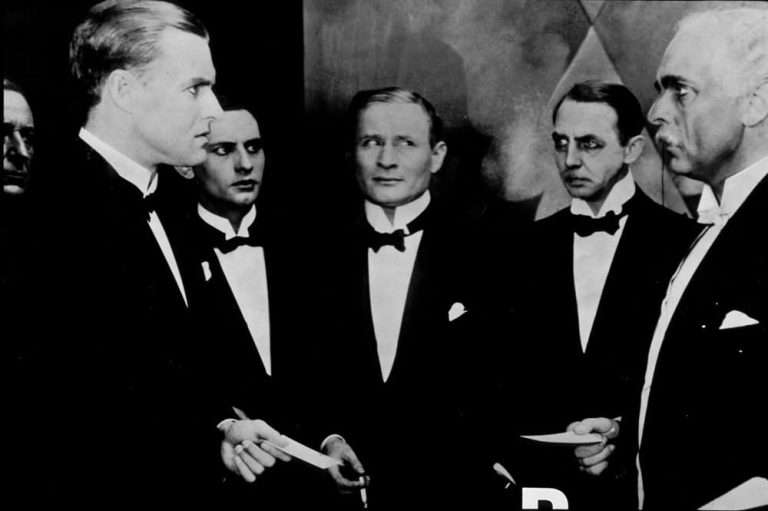David Mackenzie’s “Relay” (2025) is a sly, sleek, and silky thriller that lurches through the corridors of subterfuge and elaborate disguise. Identities are put through a churn, revealed as something starkly different than their earlier projection. The film unfolds as an extended cat-and-mouse game, with shifting stakes and revelations that race to expose who is truly complicit.
In this web of moral evasion, double-crossing, and triple-crossing, it becomes increasingly difficult to identify the actual perpetrator, the one pulling all the strings. Intentions are unclear, obscured by ulterior motives. Who can tell the truth from the lie? This becomes the playground for an unrelenting, unwavering saga that springs surprise with cold nonchalance.
This isn’t to say the film isn’t entirely satisfying. Some twists and narrative misdirection fare better than others. You don’t step into such films with expectations of an even ride. There will be a few rougher bumps than the rest. Mostly, Mackenzie executes things in an unfussy, austere manner, accentuating for a better, sharper impact.
Ahmed is a terrific lead, playing ambivalence and sincerity with a cheeky double bind, but strains of predictability seep into his performance as the film shows its cards. The film turns more generic and bland as revelations accrue, deceptions gather force. Suddenly, the filmmaker’s confidence seems to peter out amidst the escalating events.
Relay (2025) Plot Summary & Movie Synopsis:
At what point do twists become flat and redundant instead of throwing propulsive weight? This is a thin line bogging down many a thriller, constraining them to slovenly conventionality. The makers set up well with multiple lethal partners, several endings in the game. Each face hides something more dangerous within.
Guessing who will do what, flash which trick drives the tension, levels up the conceits. As the film unravels further, certain improbabilities are tacked on and on, chafing at the narrative, stretching the limits of emotional and logical plausibility. It takes the quiet charisma of Ahmed to anchor the twists that demand considerable investment. His conviction smoothens out the journey only to a degree. Is it enough to make the entire film afloat?
How does Ash orchestrate the deals?
Once, there used to be a lot of such thrillers, dogged and old-school, relying on a clutch of characters and their spiralling motivations as the conduit of suspense and damage. Individuals and big corporations are caught in a chokehold, neither condoning the other. Riz Ahmed stars as a technologist plotting in the dark, trying to goad deals between whistleblowers and imperilled companies. He is a man with several strategies up in the air. Ash tails these employees, planning to extract endangering information from them that would shield them from the company’s corrosive attacks. He’s a “fixer” who helps negotiate, the middleman who ensures safety in the process.
When the film opens, Ash has just brokered for Hoffman, an ex-employee of a pharma company. He extracts the damning documents and shuttles him to safety. Ash has his own devices that facilitate top secrecy, ensuring everything happens with clandestine efficiency. There can’t be scope for any fumbled steps, lest grave decisions will trigger forth. Enter Sarah, who has discovered her company-produced wheat has dangerous side effects. The company is insisting on a merger, despite this. She is directed to Ash, who can help her out. The way their paths intersect in a heady collision of extreme danger and uncertainty forms the thrust of the film.
Also Read: The 10 Best Suspense Thriller Movies of 2022

How innocent is Sarah?
Ash guides her on how to deflect the company from catching onto her trail. There’s a slew of red herrings with which she can shield herself from further concentrated attack. She must brace herself for maximum defence from all possible threat, whatever shape they assumes. The tension builds from the manner in which Ash cloaks his tactics.
There’s a great degree of tacitly burying the more overt plans. Sarah doesn’t want much to do with the incriminating evidence; rather get on with her life, unscathed. Ash works through a company that mediates for people hard of hearing. Ash’s inner thoughts don’t claim much of a space. He is very much a shadowy figure, dabbling in various shifting identities, disposing once a deal is done. He was once a severe alcoholic, a Wall Street trader who now slinks through this strange profession.
Meanwhile, the company tries to ferret out Ash. It’s constantly scrounging out traces of him. He’s very much pitted against the corporation. It might seem he’s too puny to take on a force as mighty as that, but he has enough smarts and cunning to tunnel out a way of resistance, to blow through the chinks in the company’s armour. The corporation tries to buy Ash out, but he dodges a tracking insertion. Slowly, Sarah’s own stakes, her connection to the case, assume clearer, disturbing patterns. Her innocence gradually grows more circumspect. Doubt fans out in the narrative as certainties of binaries dislodge.
Relay (2025) Movie Ending Explained:
Does Ash save the whistleblower?
The lay of the land changes dramatically. What we may not have expected widens to reveal newer splits, unforeseen menace. Supposedly innocent characters flare their real, unconcealed sides, expressing their absolute nefariousness. Can Ash sincerely coast through the awful schmuck, hold onto his own agenda, and save his own skin? What does it take to pull himself out before the mess exacerbates beyond repair? The clock is ticking. Ash is caught in the crosshairs of a company determined to bury all ill deeds. Will he make it out before the company gets to him? Suspense draws itself from these fluctuating beats.
What is Sarah’s true intention?
Ultimately, it’s revealed that Sarah isn’t a whistleblower; rather, she has been planted to nab Ash. Ash has been fooled all along. Optimo assigned her in order to expose and nail down Ash as well as to locate Hoffman’s records. Sarah’s treachery foils Ash’s entire carefully built plan. How could he not have seen through the ruse?
Everything seems poised on the brink of breakdown. Moral positions are ripped apart. The shape of the antagonist changes. Sarah orchestrates a final handoff to dupe Ash further. He falls for the trap. Ash somehow clobbers off the squad. Miraculously enough, he alerts the police. Finally, Sarah and Dawson’s group are apprehended, and the documents are turned over to Walsh. The company’s malfeasance now stands exposed. Of course, contrivances here are aplenty, straining belief.
“Relay” is plagued by a thinly developed relationship between Ash and Sarah, so the final payoff doesn’t hit as scabrously as it should. For the betrayal to land with necessary force, characters should have been etched more convincingly instead of a drab mess of half-explained, muddled motivations. Both Ash and Sarah ultimately come off as ciphers to advance a critique of organisationally enforced culpability. The individual is slain in the midst of trying to ensure his/her own best interests.





![Mixtape [2021] Netflix Review: An Endearing Family Drama Despite Its Familiar Beats](https://79468c92.delivery.rocketcdn.me/wp-content/uploads/2021/12/Mixtape_01_28_10_10r-768x425.jpg)

![Matewan [1987] Review – A Powerful Look at Labor Issues in Industrial America](https://79468c92.delivery.rocketcdn.me/wp-content/uploads/2021/01/Matewan-1987-768x416.jpg)
![The Age of Shadows [2016] – A Spy Thriller with Electrifying Setpieces](https://79468c92.delivery.rocketcdn.me/wp-content/uploads/2017/03/the_age_of_shadows-cover-768x433.jpg)